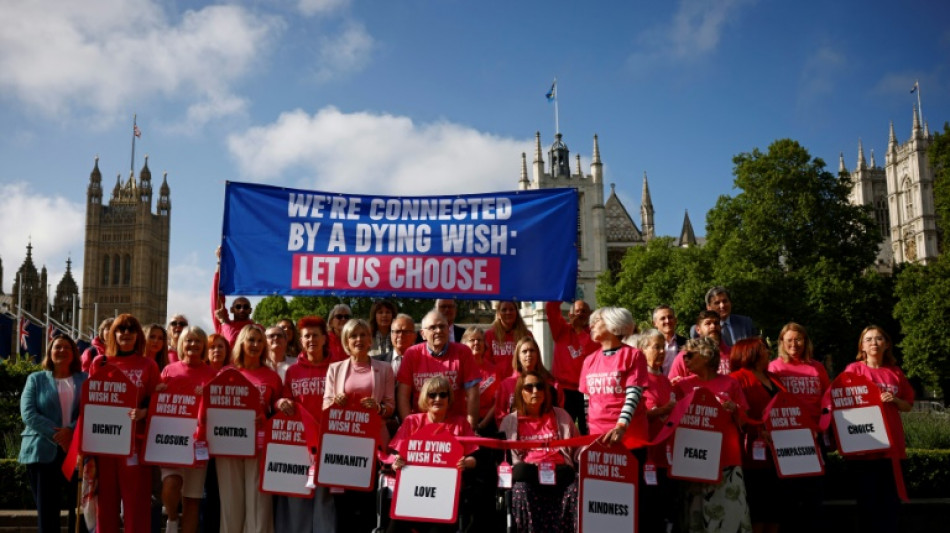

UK MPs vote in favour of assisted dying bill in historic step
Britain's parliament took a historic step towards allowing euthanasia on Friday when MPs backed contentious legislation that would introduce assisted dying for terminally ill people.
Lawmakers in the lower House of Commons chamber voted 314 in favour to 291 to send the proposal to the upper House of Lords for further scrutiny following four hours of emotional debate.
The outcome sparked celebrations among supporters gathered outside parliament who say legalised euthanasia will give people with an incurable illness dignity and choice at the end of their lives.
But opponents attending a neighbouring counter-protest said they feared vulnerable people could be coerced into dying and urged lawmakers to focus on improving palliative care instead.
The Terminally Ill Adults (End of Life) Bill would allow assisted suicide in England and Wales for adults who have been given less than six months to live.
They would have to be able to administer the life-ending substance themselves, and any patient's wish to die would have to be signed off by two doctors and a panel of experts.
A change in the law would see Britain emulate several other countries in Europe and elsewhere that allow some form of assisted dying, including Belgium and the Netherlands.
- 'Heartbreaking stories' -
Labour MP Kim Leadbeater, who proposed the legislation, told Friday's so-called third reading debate that a law change would "offer a compassionate and safe choice" for terminally ill people.
She said maintaining the status quo would mean more "heartbreaking stories" of "pain and trauma, suicide attempts, PTSD, lonely trips to Switzerland, (and) police investigations".
But Vicky Foxcroft, also of Labour, said the proposal did not include adequate safeguards for disabled people.
"We have to protect those people who are susceptible to coercion, who already feel like society doesn't value them, who often feel like a burden to the state, society and their family," she pleaded.
Outside parliament, protesters waved placards with slogans including "Let us choose" and "Don't make doctors killers".
David Walker, 82, said he supported changing the law because he saw his wife of 60 years suffer for three years at the end of her life.
"That's why I'm here, because I can't help her anymore, but I can help other people who are going through the same thing, because if you have no quality of life, you have nothing," he told AFP.
But Elizabeth Burden, a 52-year-old doctor, said she feared the legislation would open "slippery slope" where those eligible for assisted dying expands.
"Once we allow this. Everything will slip down because dementia patients, all patients... are vulnerable," she told AFP.
- Public support -
MPs in the 650-seat parliament backed an earlier version of the proposed legislation by 330 to 275 votes at an initial vote in parliament last November, a larger majority than Friday's 23.
Since then the bill has undergone several changes, including applying a ban on adverts for assisted dying and allowing all health workers to opt out of helping someone end their life.
MPs added a safeguard which would prevent a person being eligible "solely as a result of voluntarily stopping eating or drinking", ruling out people with anorexia.
Britain's medical community and Prime Minister Keir Starmer's top ministerial team are split on the proposed law change. Starmer voted in favour, while his health and justice secretaries opposed it.
But in a YouGov poll of 2,003 adults, surveyed last month and published Thursday, 73 percent or respondents backed an assisted dying law.
"Change is coming," hailed Sarah Wootton, chief executive of the Dignity in Dying campaign group.
But Catherine Robinson of Right To Life UK insisted the bill "still faces an uphill battle" to get through the Lords and her opposition campaign group "will be fighting it at every stage" to prevent it becoming law.
The House of Lords now needs to approve the legislation before the end of the current parliamentary year, likely in the autumn, or the bill will fail.
If it passes and receives royal assent, it would still be four years before an assisted dying service was implemented.
Assisted suicide currently carries a maximum prison sentence of 14 years in England, Wales and Northern Ireland.
Separate legislation is going through the devolved Scottish parliament.
At the end of March, the Isle of Man became the first British territory to pass an assisted dying bill.
Q.Papadatos--AN-GR



